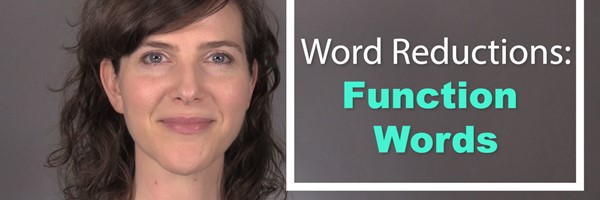In a previous video, you learned about the concepts of syllables and stress: In spoken English, some syllables are longer, or more stressed, compared to the other syllables in a word. For example, in the word banana, the second syllable “NAH”, is the stressed syllable. ba -NAH - na, ba - NAH - na. The syllable “NAH” is pronounced for a longer amount of time with more volume and at a higher pitch compared to the other syllables ba and nuh. Listen again: banana, banana.
Just like it is important to know which syllables receive the most stress, it is also important to understand which syllables are unstressed. This is where spoken English gets its rhythm and flow - from the balance between stressed and unstressed syllables.
If I were to put the stress on the wrong syllable in this word (banana), you might have a difficult time understanding what I’m saying, even if I pronounced the sounds correctly. BAH-na- nuh. BAH - na- nuh. I want a BAH-na-nuh.
So knowing which syllables to stress and unstress is vital to having clear and natural spoken English.
When a syllable is unstressed, we often reduce the vowel to the schwa /ə/, “UH”. Look at the IPA Chart for the American English vowels and notice where the schwa vowel is located.
The schwa is a neutral vowel that is made in the center of the mouth. The vowels that are produced in the outer corners of the mouth are usually reduced to the neutral schwa vowel when they occur in unstressed syllables.
Let’s look at the example word banana one more time. The unstressed syllables in this word are the first and third syllables - and you’ll notice that the vowel in both of these syllables is the schwa. The unstressed syllables are also shorter, pronounced with lower volume, and at a lower pitch - listen one more time: ba-NA-na, ba-NA-na, banana.
More examples of the schwa vowel in unstressed syllables: away, commercial, and occasion.
The vowel can also reduce in a word that is both a noun and verb, like in the words object and object. Object is a noun, and the stress is on the first syllable “AH”. Object. But in object, the verb, the stress shifts to the second syllable, and the vowel in the unstressed syllable reduces to the schwa uh. Object. Listen to them side by side: OB-ject ob-JECT.
Entire words can also reduce when they are spoken in sentences if the words are unstressed. This type of word reduction happens often to function words, such as for, at, can, and to.
Listen to how I pronounce the word for in this sentence: “I bought this for you.” For reduces to “fer” .
LIsten to another sentence using the word can - “I can do it.” Can reduces to “cn”.
Practice words with schwa in the unstressed syllable position:
animal
Florida
supply
Practice words with stress shift and vowel reductions in nouns and verbs:
Noun Verb
convert convert
perfect perfect
record record
Practice sentences with word reductions of function words:
First I’ll read the sentence at my normal pace, and then I’ll read it again slowly so you can hear the word reductions:
are - er
What are you doing?
your - yer
This is your book.
at - uht
We’re meeting at noon.
Thanks so much for watching! And I'd love to hear from you - contact me to learn how we can work together to perfect your American English pronunciation!


